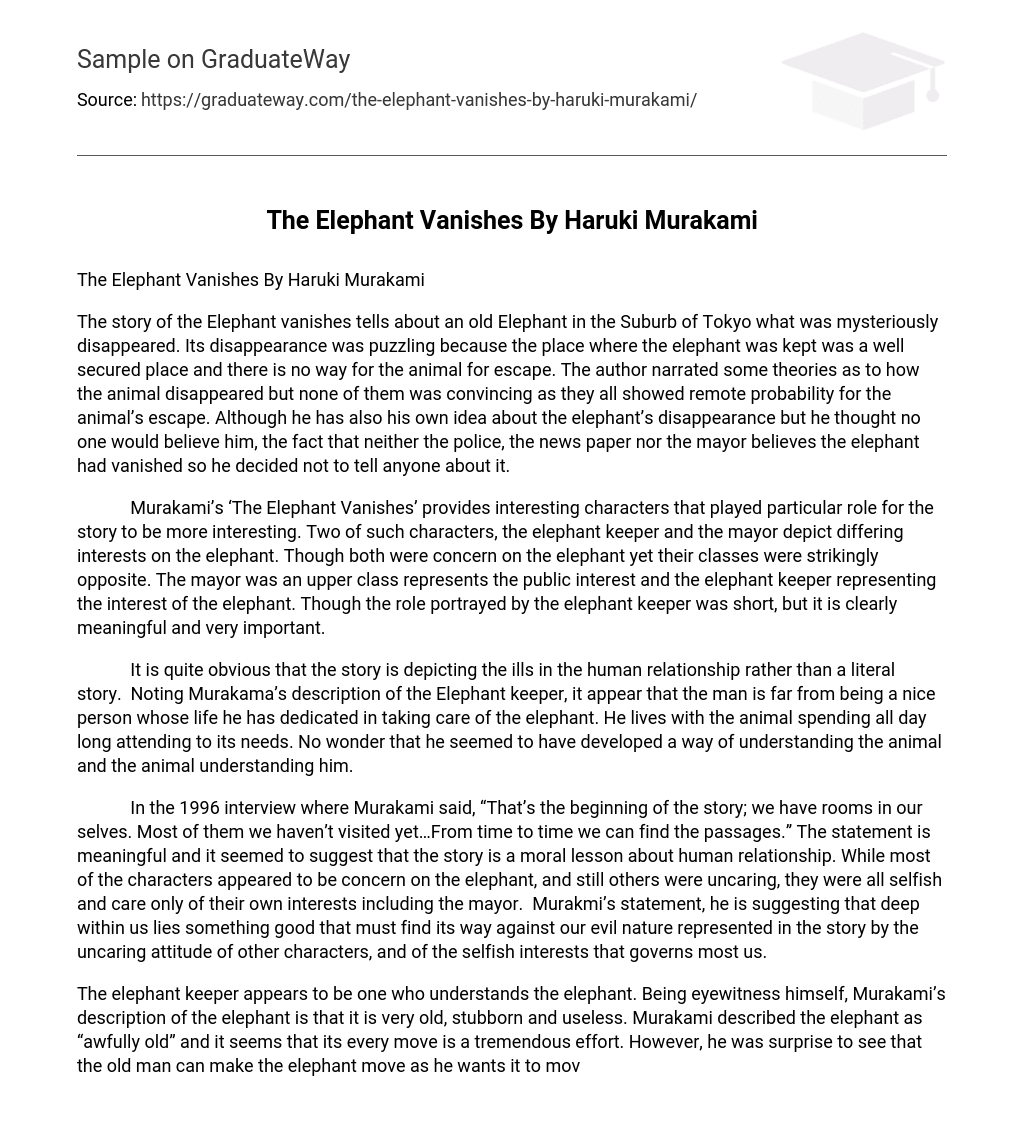The story of the Elephant vanishes tells about an old Elephant in the Suburb of Tokyo what was mysteriously disappeared. Its disappearance was puzzling because the place where the elephant was kept was a well secured place and there is no way for the animal for escape. The author narrated some theories as to how the animal disappeared but none of them was convincing as they all showed remote probability for the animal’s escape. Although he has also his own idea about the elephant’s disappearance but he thought no one would believe him, the fact that neither the police, the news paper nor the mayor believes the elephant had vanished so he decided not to tell anyone about it.
Murakami’s ‘The Elephant Vanishes’ provides interesting characters that played particular role for the story to be more interesting. Two of such characters, the elephant keeper and the mayor depict differing interests on the elephant. Though both were concern on the elephant yet their classes were strikingly opposite. The mayor was an upper class represents the public interest and the elephant keeper representing the interest of the elephant. Though the role portrayed by the elephant keeper was short, but it is clearly meaningful and very important.
It is quite obvious that the story is depicting the ills in the human relationship rather than a literal story. Noting Murakama’s description of the Elephant keeper, it appear that the man is far from being a nice person whose life he has dedicated in taking care of the elephant. He lives with the animal spending all day long attending to its needs. No wonder that he seemed to have developed a way of understanding the animal and the animal understanding him.
In the 1996 interview where Murakami said, “That’s the beginning of the story; we have rooms in our selves. Most of them we haven’t visited yet…From time to time we can find the passages.” The statement is meaningful and it seemed to suggest that the story is a moral lesson about human relationship. While most of the characters appeared to be concern on the elephant, and still others were uncaring, they were all selfish and care only of their own interests including the mayor. Murakmi’s statement, he is suggesting that deep within us lies something good that must find its way against our evil nature represented in the story by the uncaring attitude of other characters, and of the selfish interests that governs most us.
The elephant keeper appears to be one who understands the elephant. Being eyewitness himself, Murakami’s description of the elephant is that it is very old, stubborn and useless. Murakami described the elephant as “awfully old” and it seems that its every move is a tremendous effort. However, he was surprise to see that the old man can make the elephant move as he wants it to move and where he wants to stay. Here again, understanding and communication is the essential element that enable the keeper to do exactly what he wants the elephant to do. By his own effort, there is no way he could make the animal because as Murakami stated, it seems that every move the animal make is a great effort. However, by simple instruction a few words he whispered on the ear of the elephant, it voluntarily move to to obey his requests.
Perhaps the author wished to point out that today, or during his time, people were so much engrossed on material interest rather on human relationship. The People are becoming more selfish and cares only of their own interest nevertheless, he is aware that in every human being lies deep in their heart natural goodness. In a deeper analysis, the elephant symbolizes that natural goodness in the human being that is vanishing because of concerns for material possessions of this earth.
The role that memories play in the protagonist experience it leaves a picture or an image of something that was previously there but is now gone. Perhaps what the author meant for the memories is that it is a store houses of everything important that we ever imagine and everything important that we have seen. In the case of the mayor, the memories of the old elephant much less of its keeper is not important. What is more important is the place where the animal was kept as it must certainly have a higher value than the elephant.
For the elephant keeper, the memories of the elephant are very important and could not afford to lose them so he lives with it. The issue of the disappearance of the elephant may be forgotten, but then it can be retrieved when someone pay attention on it. Memories are significant because we can always draw the image of persons close to us that are no longer with us. We forget its appearance, its existence, and its manners, but its memories will always be there. As the story relates to human relationships, the story particularly fit to a marriage relationships because of the closeness of the relations between the elephant and its keeper. As many counselors emphasized, the two most important ingredients in marriage relationship is understanding and communication which was exemplify by the elephant keeper. When marriage relation is based on personal and selfish motive, one cannot expect it to prosper or progress. When it is based on understanding and communication, it will certainly survive even the test of time.
Murakami’s style of conveying his ideas to his readers is something unique as he was able to let every character express ideas even in short roles they played. His ways of constructing his stories are very natural and his use of arguments between his characters all lead in a vivid expression of the ideas that he want to convey. As whole, ‘The Elephant Vanished’ provides a very interesting story about human relationships, and an understanding how this human relationship can work.
Work Cited
Haruki, Murakami (Trans. Jay Rubin) http://www.geocities.jp/yoshio_osakabe/Haruki/Books/The-Elephant-Vanishes.html





